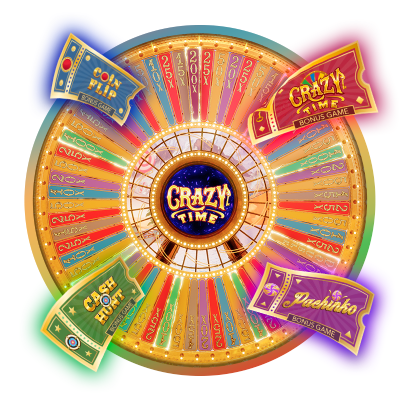
In the dynamic realm of online casino gaming, few games command attention quite like Crazy Time. Have you ever wondered what lies beneath the magnetic allure of this game?
It’s more than just spinning wheels and flashing lights—it’s the psychology behind Crazy Time’s excitement and unpredictability that keeps players coming back for more. At crazytimecasinos.in you can find the best reviews to decide where to play this and other casino games.
In this exploration, you’ll delve into the psychological facets that make Crazy Time a captivating experience, understanding why you’re drawn to its virtual thrills.
The Thrill of Unpredictability
At the heart of Crazy Time’s allure is the thrill of unpredictability. From the moment you place your bet to the electrifying spin of the wheel, the uncertain outcome triggers a rush of excitement that taps into your innate sense of adventure.
The human brain is wired to seek novelty and stimulation, and Crazy Time’s unpredictable nature fulfils this desire, offering a rollercoaster of emotions that keeps you engaged and invested.
The Highs and Lows of Emotion
The emotional journey you embark on while playing Crazy Time is akin to riding a wave—cresting with anticipation and crashing with exhilaration. As the wheel spins and the game unfolds, your emotions oscillate between hope, tension and elation.
This rollercoaster of highs and lows creates a visceral experience that triggers the release of dopamine, the neurotransmitter associated with pleasure. Your brain learns to associate Crazy Time with this rush of dopamine, reinforcing your desire to return for another dose of excitement.
The Influence of Social Proof
Ever noticed how Crazy Time’s live gameplay features a vibrant audience? That’s no accident—social proof plays a significant role in your attraction to the game.
As you watch others participate and witness their reactions, you’re subconsciously influenced by their choices and emotions. When you see fellow players celebrating a win, your brain perceives it as a potential reward, heightening your desire to take part and experience the same exhilaration.
The Illusion of Control
Crazy Time cleverly taps into the psychology of control—a fundamental human need. As you place your bets and make decisions, you feel a sense of agency, even in a game predominantly governed by chance.
This illusion of control tricks your brain into believing that your actions can influence the outcome, adding an extra layer of engagement. The interplay between randomness and perceived control is a psychological cocktail that keeps you invested and entertained.
The Gambler’s Fallacy
Crazy Time dances on the tightrope of the gambler’s fallacy—a cognitive bias where individuals believe that past outcomes influence future results. As you watch rounds unfold, your brain might nudge you to make decisions based on patterns or perceived trends.
This intricate dance between your logical mind and your emotional impulses adds a layer of complexity to the game, making each round a battle of strategy and intuition.
The Impact of Near Misses
Crazy Time often serves up near misses—those tantalising moments when your bet comes close to winning but falls short. These near misses trigger a unique psychological response: they activate the brain’s reward pathways, despite not resulting in an actual win.
Your brain interprets these near misses as signs of progress, encouraging you to continue playing in pursuit of a satisfying win. This phenomenon underscores how Crazy Time harnesses psychology to keep you engaged.
The Wrap-Up
In the captivating world of Crazy Time, it’s not just about the spinning wheels and colourful lights. It’s about the intricate dance of psychology that entices you to embark on an unpredictable journey of emotions and rewards.
The thrill of unpredictability, the influence of social proof and the illusion of control all play their part in shaping your experience. The emotional highs and lows, driven by dopamine release, further deepen your connection to the game. As you navigate the gambler’s fallacy and encounter near misses, your brain keeps you engaged, craving the next round of excitement.
So, the next time you find yourself engrossed in a game of Crazy Time, remember that it’s not just chance at play—it’s the intricate tapestry of psychology that binds you to its unpredictable allure. The excitement, the emotions, the gambler’s dance—it’s all designed to keep you at the edge of your seat, ready to spin the wheel and dive into the electrifying world of Crazy Time once again.






















